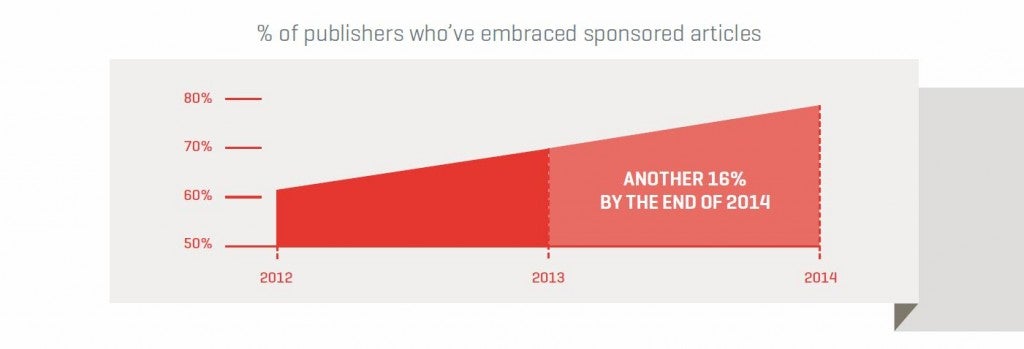
With more brands moving from content marketing to marketing content, sponsoring articles on blogs and major media outlets are beginning to raise the brows of many marketers. There is no shortage of famous examples. From The Atlantic’s Scientology debacle to The New York Times‘ Netflix ‘Orange is the New Black‘ partnership, sponsored content isn’t just here to stay, it’s growing in popularity. The numbers bear this out, too.
Hexagram and Spada conducted a study in 2013 that showed 62 percent of online publishers sold sponsored content opportunities. Furthermore, their survey showed that another 16 percent were planning on adding it to their ad inventory by the end of 2014. A study by Polar shows that 40% of publishers expect native advertising to drive a quarter or more of their revenue this year.

EMarketer’s recent 2014 Native Advertising Roundup showed nearly 75 percent of media buyers make use of native advertising. The vast majority of them, 93 percent, expect to spend the same or more on native advertising in the future, too. Spending in the U.S. is expected to grow from $1.3 billion in 2013 to $9.4 billion in 2018. According to the “Content Promotion Manifesto,” brands spent 6.7 percent of their content marketing budgets on sponsored content last year.
Related Article: Advertorials in the Age of Content Marketing and Promotion
Without question, sponsored content is potentially a powerful tool for content marketers who wish to get their content in front of new audiences to drive brand awareness, traffic and conversions. It hits audiences with context at scale. However, sponsoring content on blogs and media outlets is not as easy as using Google AdWords.
Unfortunately, as it stands today, most marketers are forced to conduct copious amounts of research to determine which blogs and media outlets to purchase from. Once the target outlets are chosen the manual effort of reaching out to each one individually and negotiating prices must begin.
It’s a lot of work to effectively add sponsored content to a brand’s promotion repertoire. It’s also challenging to track the analytics of the sponsored content. Sure, measuring referral traffic and conversions is easy, but the analytics of the actual content on the media outlet or blog itself is not typically available.
Due to the growth in popularity of sponsored content and the challenges laid out above, a small ecosystem of tools and networks is beginning to crop up to make it easier for content marketers to identify target outlets, communicate and negotiate with them, and measure the impact of the sponsored article. Below are tools and networks, many of which are featured in the “Media Buyer’s Guide to Sponsored Content,” to help marketers get started and be successful with sponsored content.
- Adproval – A media outlet marketplace for connecting publishers and advertisers.
- BlogHer – A female-focused publishing network that helps facilitate connections between media buyers and members.
- Blogvertise – A blog marketplace for connecting publishers and advertisers.
- BuySellAds – A media outlet marketplace for connecting publishers and advertisers.
- Cision – Its new content marketing database includes a searchable database of over 2,000 sponsored opportunities with thousands of U.S. publications.
- HubSpot – A recently launched ad hoc network that connects HubSpot partner agencies with publishers that use HubSpot software. Its intent is to make it easier for partner agencies to serve their clients with sponsored content and advertising opportunities.
- IZEA – A sponsorship marketplace that connects social media influencers with brands.
- Markerly – A brand amplification platform that connects brands with bloggers.
- Nudge – A comprehensive content analytics platform that supports marketers deploying sponsored content.
- Sway Group – Connects brands and agencies with the largest network of female bloggers on the web.
- The Syndicate – A brand storytelling partner and blog sponsorship network.
Don’t let the perceived laborious nature of deploying sponsored content be a hindrance to achieving your content marketing goals. Look to the tools and networks outlined above to bring context at scale to new audiences.
This article was syndicated from Relevance.com
Published: February 24, 2015
3747 Views
3747 Views












